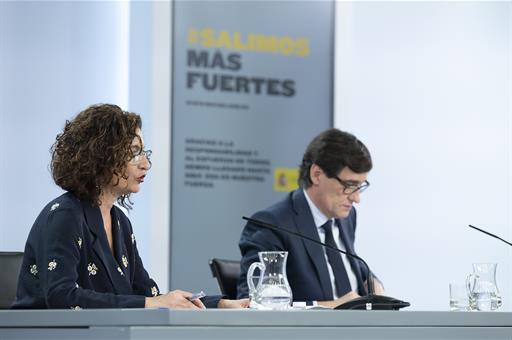Council of Ministers
Government extends state of emergency until 21 June
Council of Ministers - 2020.6.5
Moncloa Palace, Madrid
The Council of Ministers approved the extension to the state of emergency until midnight on 21 June, after receiving authorisation to that end from the Lower House of Parliament on Wednesday.
The Minister for the Treasury and Government Spokesperson, María Jesús Montero, reiterated that the state of emergency, decreed on 14 March, has been the instrument that has allowed the COVID-19 pandemic to be effectively combatted with all due constitutional guarantees, with the sole aim of halting the spread of the disease and of saving lives.
This sixth and final extension, continued María Jesús Montero, will allow the de-escalation process to be culminated. When regions move to Phase 3, it will be the regional governments that will adopt the corresponding decisions to then request their move to the new normality. "This is our model of country - a strong and cohesive State in which the regional authorities are the cornerstones of the Welfare State and where we all pitch in", she stressed.
Unity for health, economic and social reconstruction
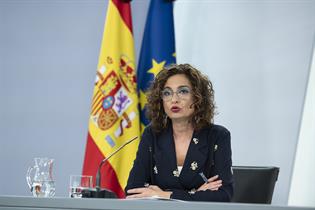 Pool Moncloa/Borja Puig de la BellacasaThe Government Spokesperson called for the unity of all institutions and political groups in addressing the health, economic and social reconstruction of Spain, and considers that "society is calling for us all to be able to forge agreements".
Pool Moncloa/Borja Puig de la BellacasaThe Government Spokesperson called for the unity of all institutions and political groups in addressing the health, economic and social reconstruction of Spain, and considers that "society is calling for us all to be able to forge agreements".
María Jesús Montero advocated useful politics "that serve the general interests of society and are capable of overcoming legitimate differences to agree measures that are good for everyone".
In this regard, she quoted, by way of example, the meetings with business leaders and trade unions - the Social Dialogue Board met on Thursday - who she thanked for their disposition to agree on measures and strategies to ensure the recovery of the productive fabric.
Gratitude to society and public and private professionals
On behalf of the government, María Jesús Montero congratulated all healthcare workers, who will receive this year's Princess of Asturias Award for Concord. "They represent the very best of us", she said, "for their selfless effort and sacrifice to the benefit of Spanish society and their unquestionable humanity over and above their professional obligations".
María Jesús Montero highlighted their work and that of all public workers who have worked with "diligence and professionalism", from the State law enforcement agencies to teaching staff, social service workers, the State Public Employment Service (Spanish acronym: SEPE) and the social security system, and transport and mobility workers and the cleaning sector. At a private level, she mentioned such essential services as energy, telecommunications, logistics, the manufacturing industry, the pharmaceutical industry, agriculture and fisheries.
The Government Spokesperson thanked Spanish society for its efforts, sacrifice and discipline shown over recent weeks, and announced that "we will also take" the path to the new normality "together, in good spirit and with hope".
When the whole country is in the situation of the new normality, María Jesús Montero recalled that a State ceremony will be held, presided over by the King, in memory of and in tribute to the victims of the pandemic. The 10-day period of official mourning decreed in their memory will finish on Friday night.
52% of population will be in Phase 3 on Monday and 48% in Phase 2
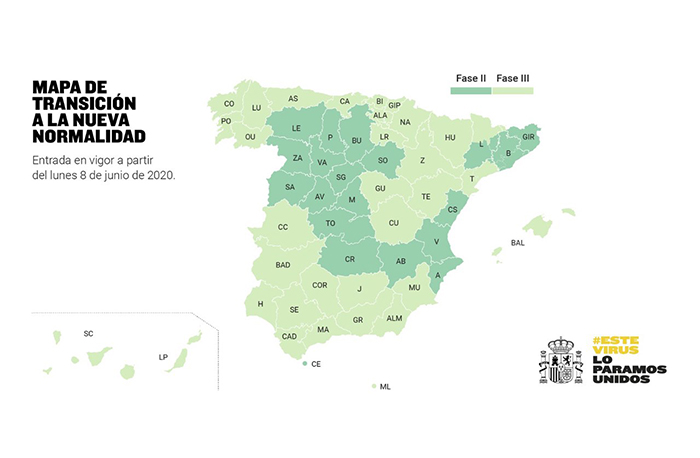
The Minister for Health, Salvador Illa, reported that 24 million citizens will resume the activities contained in Phase 3 of the De-escalation Plan on Monday and 23 million will move to Phase 2.
Salvador Illa specified that all the territorial units of the Autonomous Region of Castile and Leon will move to Phase 2 of the de-escalation, along with the health district of Barcelona, which includes the city of Barcelona, the north and south metropolitan districts, and the health district of Lleida in Catalonia. The whole of the Region of Madrid will also move to Phase 2.
The areas that will move to Phase 3 are all the territorial units of Andalusia, including Malaga and Granada, Aragon, Asturias, the Balearic Islands, the Canary Islands and Cantabria, the provinces of Guadalajara and Cuenca in Castile-La Mancha, the health districts of Alt Pirineu i Aran, Terres d'Ebre and Camp de Tarragona in Catalonia, Extremadura, Galicia, La Rioja, Navarre, Melilla, Murcia and the Basque Country.
Exemplary lockdown and new normality
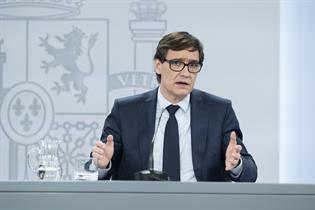 Pool Moncloa/Borja Puig de la BellacasaThe Minister for Health highlighted the exemplary behaviour of the Spanish people since the state of emergency was decreed 82 days ago.
Pool Moncloa/Borja Puig de la BellacasaThe Minister for Health highlighted the exemplary behaviour of the Spanish people since the state of emergency was decreed 82 days ago.
In this regard, the minister highlighted the determination shown by the Spanish people to comply with "the strictest lockdown in the European Union, and one of the strictest in the world", and "the smooth functioning and effectiveness of the constitutional tool of the state of emergency to tackle pandemics".
Salvador Illa also underlined the role of the regional governments in the exercise in co-governance. On Sunday, he recalled, the 13th conference will be held between the President of the Government and the regional presidents. "We have held almost 30 plenary sessions of the Inter-territorial Council of the National Health System in an unprecedented exercise in coordination and joint response to the worst pandemic in 100 years", he added.
The minister confirmed that the Council of Ministers will approve a Royal Decree-Law that will include measures that need to be adopted in the new normality to live with the coronavirus until an effective treatment or vaccine is discovered to defeat it. This new legislation will include contributions from the regional councillors with whom the minister is meeting.
He also stressed the importance of remaining prudent in the final stretch of the de-escalation process. "The virus is still out there, well controlled but lurking".
During his press briefing, Salvador Illa underlined that the presidents of those regions that are in Phase 3 can take the decision to move to the new normality according to their respective epidemiological figures.
When asked about the number who have died from the pandemic, the minister argued that the Ministry of Health uses the figures issued by such international health authorities as the World Health Organization and the European Centre for Disease Prevention and Control.
The government, he said, is adjusting the figures for both the number of cases and the number of deaths and, once the regional authorities finish correctly dating all the deaths, the figures will be included in the report that the ministry will publish.
Spain and Italy ask for coordination over opening borders in Europe
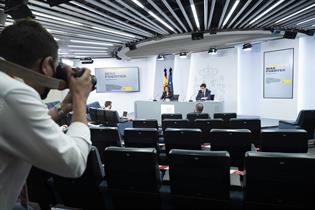 Pool Moncloa/Borja Puig de la BellacasaThe Government Spokesperson reported that the President of the Government, Pedro Sánchez, and the Italian Prime Minister, Giuseppe Conte, have sent the President of the European Commission, Ursula von der Leyen, a joint letter regarding lifting border controls in the European Union.
Pool Moncloa/Borja Puig de la BellacasaThe Government Spokesperson reported that the President of the Government, Pedro Sánchez, and the Italian Prime Minister, Giuseppe Conte, have sent the President of the European Commission, Ursula von der Leyen, a joint letter regarding lifting border controls in the European Union.
The two countries, "among the worst hit by the pandemic, and also among the most attractive tourist destinations in Europe", said María Jesús Montero, advocate coordinating the recovery of the freedom of movement throughout the Schengen Area, so that this easing is based on epidemiological criteria that are "common, clear and transparent". They also propose that it should be the European Centre for Disease Prevention and Control that heads up this process.
As regards the EU's external borders, Spain and Italy propose they be opened up gradually and in coordination, using defined criteria, such as the rate of COVID-19 in third countries, explained María Jesús Montero.
In the letter addressed to Ursula von der Leyen, Pedro Sánchez and Giuseppe Conte also argued that transport should be governed by "harmonised and widely agreed" health and safety protocols", particularly at borders, both within the Schengen Area and at external borders, concluded the minister.
Non official translation





